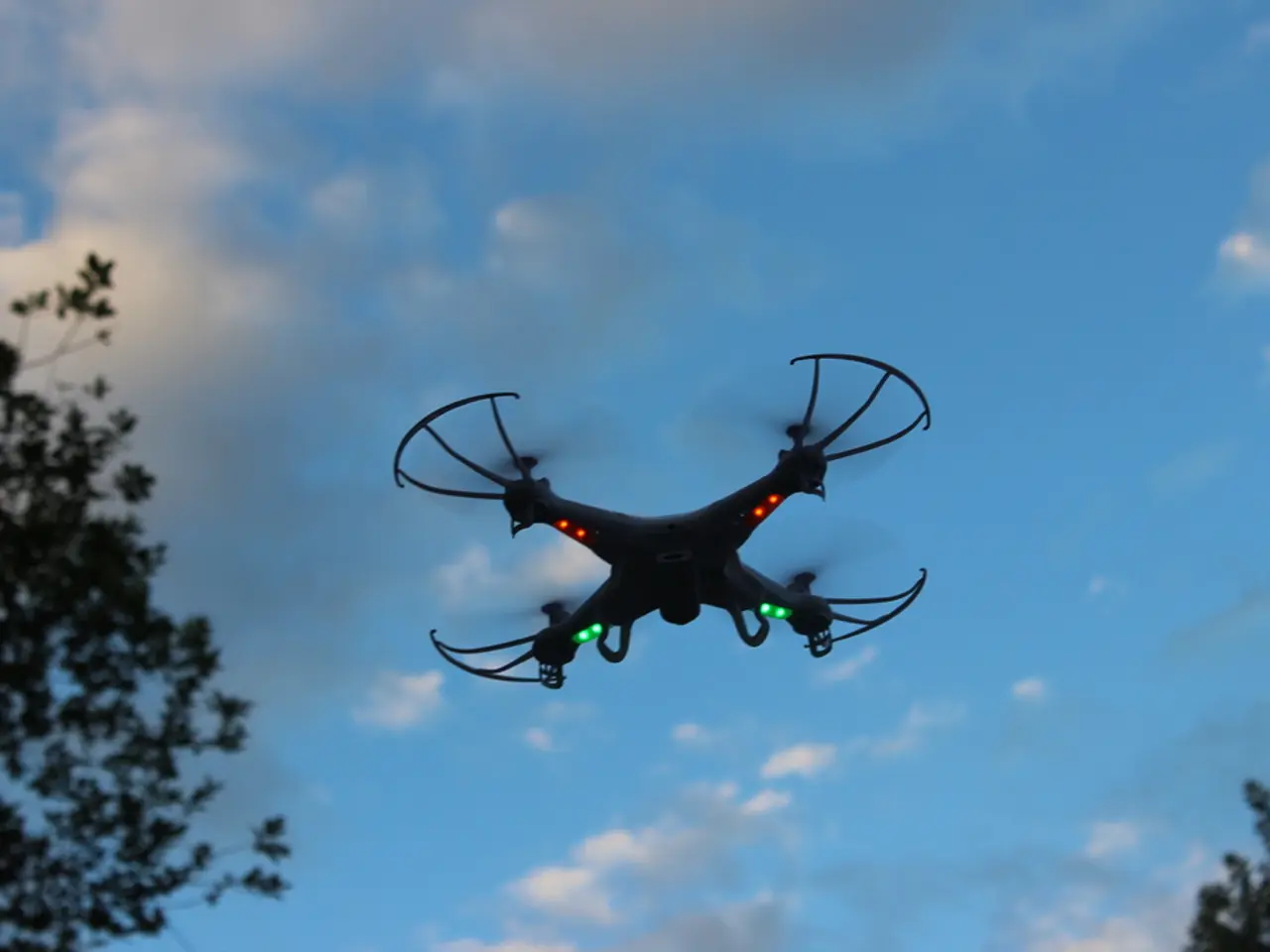Drones deployed by local councils to detect any violations of planning regulations
UK Local Councils Embrace Drones for Planning Enforcement, But with Strict Privacy Regulations
In an increasingly digital age, local councils across the United Kingdom are turning to drone technology to aid in monitoring potential planning and building regulation breaches. From Bradford to Windsor and Maidenhead, councils are leveraging drones, or unmanned aerial vehicles (UAVs), to document development activities, investigate dangerous structures, and create 3D digital models [1].
However, the use of drones for planning enforcement is not without controversy. The primary concern revolves around privacy. As drones are capable of capturing aerial imagery, questions have been raised about the potential infringement upon the public's personal space [2]. Toby Green, a privacy advocate, has expressed similar worries [3].
To address these concerns, local councils must comply with several privacy regulations. Firstly, drone operators must adhere to the UK Civil Aviation Authority (CAA) rules, which include obtaining appropriate authorisations, possessing the necessary pilot qualifications, and not exceeding visual line-of-sight or altitude limits [1][3].
Secondly, when drones capture images or video, the data must be processed according to UK data protection laws, specifically the General Data Protection Regulation (GDPR). This means that local councils must ensure that any personal data collected is handled lawfully, for a defined purpose, kept secure, and that privacy rights of individuals are respected [4].
Operational restrictions to safeguard privacy are also in place. Operators must maintain a horizontal distance of at least 150 meters from residential, commercial, recreational, or industrial areas if uninvolved individuals are present, and never fly over uninvolved people to minimize privacy impact [1].
In some cases, councils may need additional permissions to operate drones in restricted or sensitive areas, such as around residential zones or other protected sites where privacy concerns are heightened [1].
The Information Commissioner's Office (ICO) believes that councils need to be transparent and provide advance notice if drones are going to be flown over residential areas [4]. Homeowners can make a Subject Access Request (SAR) to their local council to see what information is held about them and request it be removed if they have concerns about privacy.
The Royal Town Planning Institute's Planning Enforcement handbook requires operators to have full accreditation, pass safety training, and ensure drones do not pose a risk to people, animals, or structures [5].
In summary, local councils conducting drone-based planning enforcement in the UK must comply with CAA flight regulations, ensure data captured respects GDPR privacy standards, and follow operational guidelines to avoid intruding on individuals' privacy. Failure to comply risks legal sanctions including penalties related to airspace rules and data protection breaches [1][3][4].
References:
[1] UK Drone Operations Manual - Planning Enforcement. (n.d.). Retrieved from https://www.gov.uk/government/publications/uk-drone-operations-manual---planning-enforcement/uk-drone-operations-manual---planning-enforcement
[2] Drones for planning enforcement: What you need to know. (2021, March 29). Retrieved from https://www.localgov.co.uk/drones-for-planning-enforcement-what-you-need-to-know/101277
[3] Green, T. (2021, April 1). Drone surveillance: A privacy concern for residents. Retrieved from https://www.theguardian.com/technology/2021/apr/01/drones-surveillance-a-privacy-concern-for-residents
[4] ICO. (2021). Drone surveillance: A guide for local authorities. Retrieved from https://ico.org.uk/media/for-organisations/documents/2148145/drone-surveillance-a-guide-for-local-authorities.pdf
[5] The Royal Town Planning Institute. (2021). Planning Enforcement Handbook. Retrieved from https://www.rtpi.org.uk/knowledge-and-resources/publications/planning-enforcement-handbook
- The UK Civil Aviation Authority (CAA) requires drone operators to obtain appropriate authorizations, possess necessary pilot qualifications, and maintain a horizontal distance of at least 150 meters from residential, commercial, or recreational areas to comply with privacy regulations.
- To ensure drone data processing adheres to UK data protection laws, local councils must handle personal data collected during operation lawfully, for a defined purpose, securely, and respect the privacy rights of individuals according to General Data Protection Regulation (GDPR).
- The Information Commissioner's Office (ICO) suggests that councils be transparent, providing advance notice if drones are going to be flown over residential areas, allowing homeowners to make a Subject Access Request (SAR) to see what information is held about them and, if they have concerns about privacy, request its removal.
- The Royal Town Planning Institute's Planning Enforcement handbook stipulates that drone operators must have full accreditation, pass safety training, and ensure drones do not pose a risk to people, animals, or structures in addition to the guidelines outlined for privacy regulations.
- Navigating the intricate web of drone technology, gadgets, and the various regulations controlling their use in planning enforcement can be a challenge, requiring a comprehensive guide to fully understand the costs, planning, extension, design, build, and operations involved in such operations.




